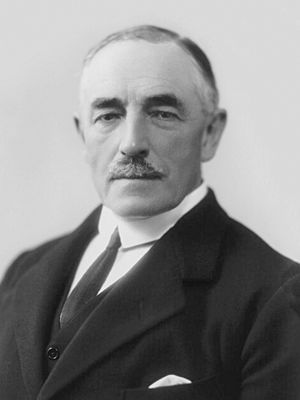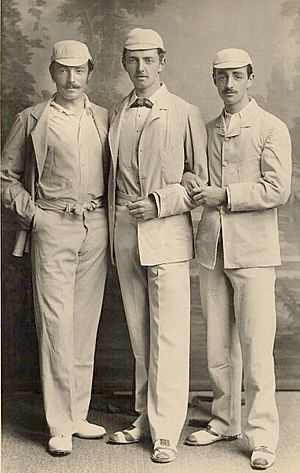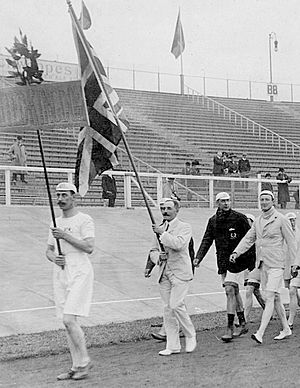Kynaston Studd facts for kids

Studd in 1923
|
|||||||||||||||||||||||||||
| Personal information | |||||||||||||||||||||||||||
|---|---|---|---|---|---|---|---|---|---|---|---|---|---|---|---|---|---|---|---|---|---|---|---|---|---|---|---|
| Full name |
John Edward Kynaston Studd
|
||||||||||||||||||||||||||
| Born | 26 July 1858 Tidworth, Wiltshire, England |
||||||||||||||||||||||||||
| Died | 14 January 1944 (aged 85) Marylebone, London, England |
||||||||||||||||||||||||||
| Batting | Right-handed | ||||||||||||||||||||||||||
| Bowling | Right-arm fast | ||||||||||||||||||||||||||
| Domestic team information | |||||||||||||||||||||||||||
| Years | Team | ||||||||||||||||||||||||||
| 1878–1885 | Cambridge University | ||||||||||||||||||||||||||
| Career statistics | |||||||||||||||||||||||||||
|
|||||||||||||||||||||||||||
|
Source: CricInfo, 17 November 2022
|
|||||||||||||||||||||||||||
Sir John Edward Kynaston Studd, 1st Baronet OBE (born July 26, 1858 – died January 14, 1944) was a famous British cricketer. He was also a successful businessman and later became the Lord Mayor of London. Many people knew him as "JEK."
Contents
Family Life and Connections
Kynaston Studd was born in Tidworth, Wiltshire. He first married Hilda Proctor-Beauchamp in 1884. They had five children together. Later, in 1924, he married Princess Alexandra Lieven. He passed away in Marylebone, London, when he was 85 years old.
His children with Hilda Proctor-Beauchamp were:
- Sir Eric Studd, who became the 2nd Baronet, born in 1887.
- Ronald Granville Studd, born in 1889.
- Reverend Lionel Fairfax Studd, born in 1891.
- Bernard Cyril Studd, born in 1892.
- Vera Constance Victoria Studd, born in 1897.
He did not have any children from his second marriage.
Kynaston Studd's Sporting Career
Kynaston Studd was well-known for his skills in cricket. He was the oldest of three brothers who were all famous cricketers. They were often called "The Studd Brothers."
Cricket at Cambridge University
Kynaston was a great player at Eton College. He never lost a game against rival schools like Harrow and Winchester. In 1879, he went to Trinity College, Cambridge. He played for the university's cricket team for four years.
In 1882, Kynaston and his brothers played a very important game. They helped their team beat the strong Australian side. This Australian team later famously beat England. In that match, Kynaston scored 6 and 66 runs. His brothers also scored many runs, helping Cambridge win.
Representing Great Britain at the Olympics
The 1908 Olympic Games in London were the first to have a parade of nations. Kynaston Studd had the honor of being the first person to carry the flag for Great Britain at an Olympic event. Even though cricket was only played at the 1900 Olympic Games, Studd was still a significant figure in the Olympic movement.
Life After University
After leaving Cambridge, Kynaston Studd played cricket for Middlesex sometimes. However, he spent most of his time working in business. He also became the president of the Royal Polytechnic Institute in 1903 and stayed in that role until he died.
Public Service and Honors
Kynaston Studd received an award called the OBE in 1919 for his contributions.
He served as the Sheriff of London from 1922 to 1923. After that, he was knighted in 1923, which means he received the title "Sir." He then became the Lord Mayor of London from 1928 to 1929. At the end of his time as Lord Mayor, he was given the title of Baronet.
In 1930, while he was President of the MCC, he hosted a special dinner for the Australian cricket team. His great-nephew, Sir Peter Malden Studd, also became Lord Mayor of London many years later.
Legacy and Impact
Canon F. H. Gillingham, a former cricketer, spoke at Studd's memorial service. He said that Kynaston Studd understood that sports were just a way to prepare for more important duties in life. He believed that Studd made it easier for people to be good and harder to do bad things. Gillingham said, "Everything he touched he lifted up."
The Studd Trophy is an award for athletic achievement at the Royal Polytechnic Institution. It is named in his honor.
 | George Robert Carruthers |
 | Patricia Bath |
 | Jan Ernst Matzeliger |
 | Alexander Miles |



